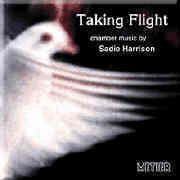METIER MSV CD92084 [68 mins] http://www.metierrecords.co.uk
The Light Garden is a 'cross-over' offering of the highest quality, with no compromise for popular taste and exemplifies the flexible approach to "serious" music which Musical Pointers aims to cover.
Today's confusion of genres is reflected in Metier's suggestion that this CD can be shelved under World Music and Classical Contemporary categories - both to cast an appropriately wide purchasing net! Its arrival, whilst reading the late Edward W Said's seminal book Orientalism, was timely.
Sadie Harrison's music is suffused with a deep knowledge and love for Afghanistan, The Light Garden based on the Afghan naghma-ye kashai, two contrasting moods juxtaposed with a 'darkly ironic' stance. It is played excellently by the young Tate Ensemble. The Fourteenth Terrace features the clarinet with ensemble, whereas Bavad Khair Baqi! is a 'condensed and fractured' derivation from the earlier works' material; 'meant to be a struggle - edgy, desperate, with suppressed aggression and exhausting'. It is an ideal vehicle for that most veratile and innovative of violinists, Peter Sheppard Skærved.
Sadie Harrison's works are interposed with traditional Afhgan music, performed by leading experts in an unfamiliar field; just the right setting, and the tracks just the right lengths.
But what makes this CD unique, and one not to be missed on any account, is David Lefeber's multimedia presentation, which includes:
. an illustrated talk on the composition of the trilogy
. articles on the music and culture of Afghanistan
- biographies of composer and performers
. web links to numerous related sites
- photographs taken during the recording sessions
The latter are to be welcomed especially, because although the notes by Sadie Harrison, John Bailly and Veronica Doubleday are excellent, the postage stamp sized photos are really too small for the miniscule faces to register.
This is without question one of my top recordings of the year, a ground-breaking release which points to the future scope of CD presentation in a way similar to how OpusArte's Hidegard von Bingen issue does so for DVD. The Metier CD's given total timing is a very sufficient 68 minutes, but the package offers you several additional hours instruction and illumination. The extras are easy to access and navigate; they work like a charm and enhance enjoyment and appreciation exponentially.
I had missed out on earlier recordings of Sadie Harrison's music and have lost no time in catching up.
 Taking Flight (2000) is a collection of her chamber music of the late '90s and is a typically excellent Metier production. A well varied selection whch makes a coherent and well ordered concert if played straight through, from the eponymous string quartet, substantial and thought provoking, to a substantial song cycle with flute and string trio. Taking Flight (2000) is a collection of her chamber music of the late '90s and is a typically excellent Metier production. A well varied selection whch makes a coherent and well ordered concert if played straight through, from the eponymous string quartet, substantial and thought provoking, to a substantial song cycle with flute and string trio.
Chief mover in compiling the CD seems to have been Peter Sheppard Skaerved, who contributes a thoughtful, interesting essay alongside Sadie Harrison's own commentaries, and plays music for violin and piano with his partner Aaron Shorr (a fine counterpoint to their Beethoven project now under way).
His Kreutzer Quartet negotiates the complexities of the string quartet, which might be better known but for its heavy demands, more upon the players than the listener - it has a quiet centre, surrounded by 'frenetic activity, hyper- physicality' and a 'whizzing, spitting Catherine Wheel' on the last pages; invigorating stuff.
To end, Lesley-Jane Rogers gives a compelling account of Harrison's setting of ancient text fragments from a 1928 Greek Anthology. Her voice is pure and steady and only a few times is she beaten by impossibly high tessitura for getting words across, notably in Love the Conqueror. Support by flute and strings takes this work into a different area, to end an absorbing hour and ten minutes of music which you will want to hear more than once.
There really is no point in expanding on the music's various beauties here; see instead an impressive series of enthusiastic reviews available instantly at the click of your mouse and put these CDs on your Christmas list!
Peter Grahame Woolf
|



